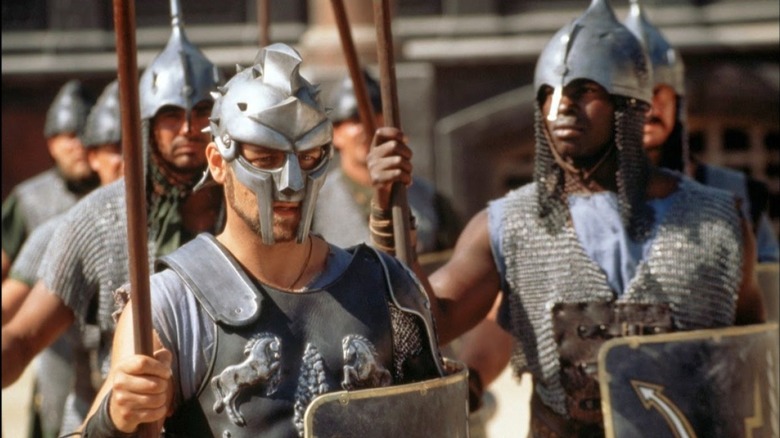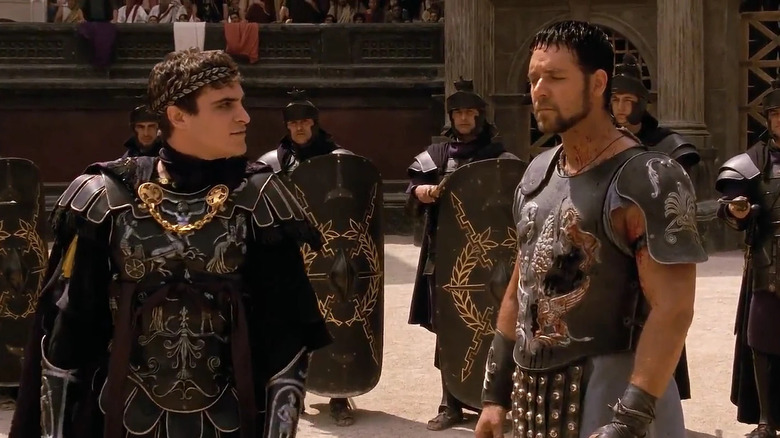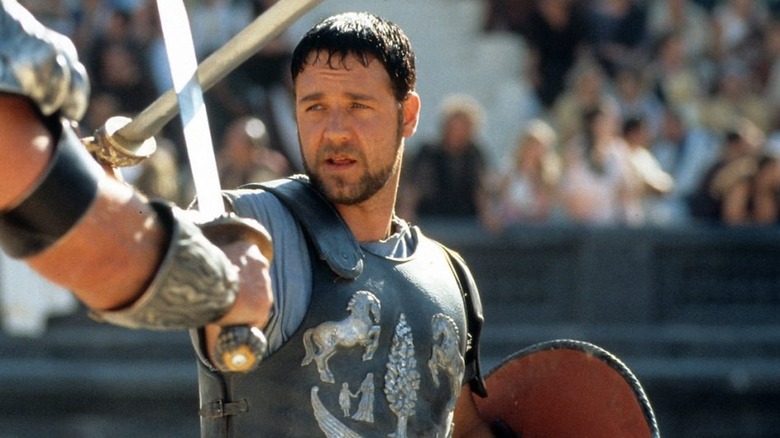Russell Crowe Put Some Personal Touches On His Gladiator Costume
As far as historic epics go, "Gladiator" remains one colossally beautiful and bloody masterpiece. Ridley Scott's tale of revenge stars Russell Crowe as the Roman general Maximus betrayed into slavery by usurping Emperor Commodus (Joaquin Phoenix). It's definitely not a movie anyone's in danger of snoozing in, especially with its grandiose shots of the Coliseum and its brutal fight scenes. It's epic in every sense of the word, even if it is filled with historical anachronisms that make it a less than realistic portrayal of the period.
One area that fell prey to such inconsistencies was the costume department, though that doesn't make the outfits any less stunning. This is especially true of those worn by Roman nobility and various gladiators, including Maximus, who takes on the moniker "The Spaniard." Maximus' armor was actually a key piece in developing the character's gladiatorial look and backstory, and Crowe himself is responsible for suggesting to Scott that certain changes be made to his breastplate.
Crowe suggested adding those silver icons on his armor
Costume designer Janty Yates is the source of this "Gladiator" trivia. In an interview on Academy Originals, she revealed there were a total of 12 sets of armor created for Maximus. Yates also explained how Crowe put his own personal touch on the armor of his character:
"As Russell, or Maximus, succeeds, fight after fight, he adds another figurine to the breastplate. The breastplate is made in hardened black leather. And then, the actual pieces are not real silver, but they're made to facsimile silver. The idea of the additions to the cuirass in silver was actually Russell's own idea, and he talked it over with Ridley. They both thought it was a wonderful thing. I hope that people will take away a feeling of strength, and the fact that Russell's character is just so muscle-rippingly strong, and noble, and honest, and true. I think that shows in this breastplate."
Even though we as the audience might not see the gladiator fights in which Maximus earns those silver additions, it's important to give them a bit of representation. They flesh out the character's servitude as a gladiator and also give his normally plain-black armor some necessary pomp. Maximus is evidently a silver kind of guy too, which points to his virtuousness. Gold being so tastelessly flashy for a gladiator, something Commodus obviously takes zero issues with given his outfit in their final confrontation. But knowing that Crowe wanted to give particular emphasis to the icons on his cuirass also points to just how much he was dedicated to his character's look. It's also not the only contribution or suggestion he made for Maximus.
Maximus' horses reference two western heroes
We might not know the exact reasons Crowe wanted to give his armor these silver accents, but there are plenty of reasons why it works. One of them is that at least two of the icons – the horses rearing up – are actually mentioned by Maximus himself in the film. The moment comes when he meets Lucius, son of Lucilla and nephew to Commodus, and learns he's an admirer of "The Spaniard." Maximus reveals to the boy that the horses on his armor are named after two he actually owned named "Argento" and "Scatto." But in the theatrical cut audio commentary, Scott confessed Crowe helped him come up with names:
"Was going round and round in circles about what to call the horses on his chest, so Russell said to me...'Silver and Trigger.' He said, 'You think anyone will notice?' And I said, 'If they do, it's kind of amusing.'"
Do you think anyone will notice? What is it you think we do here besides obsessively comb through films like "Gladiator" in search of kernels of trivia gold like this? Of course, someone would notice that the names of the two horses Maximus' memorializes are shared by the noble steeds ridden by "The Lone Ranger" and "Roy Rogers." This might be a tale about ancient Rome, but does that mean Maximus can't be a fan of two western heroes that wouldn't arrive for hundreds of years? Chalk it up to just one more of the film's little anachronisms.
Given that Crowe won an Oscar for Best Actor for his role as Maximus, it's clear he cared about the character's portrayal. In fact, Crowe was so passionate about the characte that, at one point during filming, the actor vehemently refused to say one of the character's most iconic lines. Still, Crowe's attempts to fine-tune Maximus are perhaps the reason he won the award at all. But with Scott vowing he's ready to return to Rome in "Gladiator 2," including plans to resurrect Maximus for it, it's safe to say the director didn't mind the actor's additions or attempted revisions.


